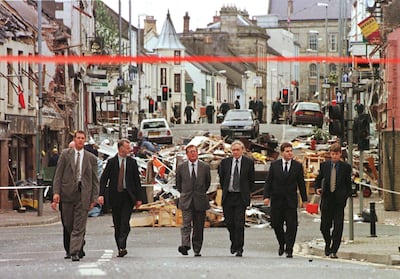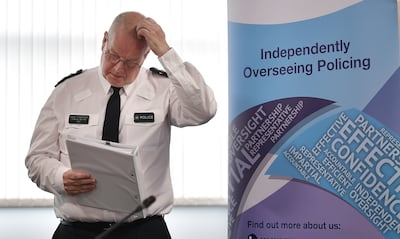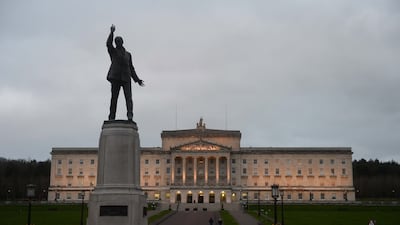It’s easy to forget the mistakes of the past. It’s even easier if you are too young to remember them. And that’s part of the problem with the British government and Northern Ireland. There is collective amnesia in much of the current British political generation about a century mostly of neglect for Northern Ireland since it was created in the 1920s – neglect, until the bombs and shootings started.
That neglect from Westminster allowed representatives of the Protestant majority in the Stormont parliament near Belfast to discriminate against the Roman Catholic minority for generations. It blew up – literally – in the violence of the Troubles from 1968 until the Good Friday Agreement of April 10, 1998.

During the Troubles about 3,000 people were killed, around 300 of them police officers. British government indifference towards Northern Ireland was disastrous then and it could be repeating the same mistake now. The shadow of a gunman - as the Irish playwright Sean O’Casey once called it – remains.
I lived and worked in Northern Ireland during the Troubles and knew people who were murdered, brutalised, kneecapped, jailed for crimes they did not commit and traumatised.
Kneecapping, by the way, was a punishment for supposed offences used by illegal paramilitary organisations to terrorise the public. The knees of those considered to be offenders were shot off with a variety of weapons. Some never walked again. I am mentioning these horrors because after a generation of (mostly) peace, Northern Ireland’s cities and towns are thriving and unrecognisable from the places where bombs were going off almost daily, destroying shops, offices and lives. But that peace looks increasingly fragile.
The roots of the current problem lie in Brexit. Northern Ireland voted to remain in the EU but former UK prime minister Boris Johnson’s government made unionists – those who want to remain part of the UK – feel badly treated. That’s because he agreed – in effect – to move the Irish border in trade and customs terms into the Irish Sea.
Treating Northern Ireland differently from England, Scotland and Wales is a red line for unionists. It led to the collapse of the power-sharing government at Stormont, with the biggest unionist group refusing to work with the Irish republican party, Sinn Fein.
Beyond this political vacuum and a lack of energy at Westminster there is now an urgent problem. The massive data breach of information revealing the identities and personal details of 10,000 officers and civilian support staff in the Police Service of Northern Ireland puts lives and therefore peace at risk.

Dissident republican terrorists – those who believe they can somehow "unite" Ireland by killing people – now have information which can enable them to strike terror into the forces tasked with keeping law and order. Despite the ceasefire from the Provisional IRA, those dissident republicans have continued a sporadic campaign of terror in which police officers have been attacked and shot.
Politicians from both Protestant and Catholic communities are trying hard to prevent further violence and to find those responsible for the data breach but that is not enough. The British government needs to get a grip. Yet many politicians in England think there are few votes for them spending energy on Northern Ireland.
Mr Johnson as prime minister was particularly cavalier. Unionist politicians who passionately want to be part of the UK spoke of Mr Johnson as an “English nationalist”, who only thought about England (where most of his voters live) and had little interest in Northern Ireland, Scotland or Wales.
In the autumn, I’m heading to Belfast, a city I love. Friends there often reflect on how British government carelessness is an unwelcome tradition. Nature proverbially abhors a vacuum and the political vacuum at Stormont is loved only by those disruptive dissident terrorists.

UK Prime Minister Rishi Sunak doesn’t even seem to have Northern Ireland on his political "to do" list. Yet this is a moment which demands leadership, and Mr Sunak should lean hard on unionist politicians to push them to return to some kind of Northern Ireland government. He also must provide whatever resources are necessary to ensure that police officers and their families can feel safe in their homes at night and even be moved elsewhere if necessary.
But Mr Sunak’s Conservative Party is beset by other problems and internal divisions. For months it has trailed way behind the opposition Labour Party in popularity with a general election thought likely in autumn 2024.
Mr Sunak is confronted with economic difficulties, failing infrastructure, migrant boats, the Brexit mess, industrial disputes, profound dissatisfaction with the National Health Service and a long list of other gripes and grievances.
But instead of the Sunak legacy being that of a caretaker prime minister achieving very little and perhaps losing badly – as the polls seem to predict – in 2024, he could use his energy and influence towards ensuring peace and tranquility for British citizens in Northern Ireland who, (rightly), often feel they are ignored. The alternative – endless political stalemate coupled with a return to violence and instability – is too grim to contemplate.


